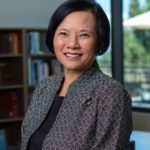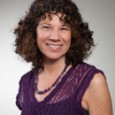February 19, 2016
This symposium took a great amount of planning but the payoff was tremendous. After brief welcome remarks by CGLP Director Anna Han and members of the Journal of International Law, Alvin Yu, Editor in Chief and Kendra Livingston, Symposium Editor, the first panel of the morning tackled the difficult issues of human trafficking and immigration.
The panel organized itself to tell the plight of the victims of human trafficking in a story arc. Karen Musalo spoke on why victims flee their home countries in Central America. Often, the violence forces entire families to abandon their homes, friends, and relatives and embark on a dangerous and harsh journey. When femicide goes unpunished 98% of the time in their home country, leaving seems like the only option for many women. Laurie Cook Heffron then discussed the dangers of the journey, including rape and the possibility of death. Elvia Arriola detailed the dehumanizing conditions of the detention camps that these victims face when they actually arrive in the US. There, some of the violence follows them. Families can be separated and the systemic problems with the way these victims are treated and the lack of even pro bono legal help was a chilling reminder of why we must keep raising these issues. Last, Martina Vandenberg discussed the possible remedies and how some progress might be made by suing and making the traffickers liable for damages under the Palermo Protocol on the prevention, suppression and punishment of Trafficking in Persons Especially Women and Children. She cited two cases that brought some measure of hope by making the traffickers accountable and perhaps, one day, may result in the decrease of trafficking. The panel was moderated by Lynette Parker, a member of our faculty and an immigration attorney working at the Katherine & George Alexander Community Law Center at SCU.
The second panel dealt with a wide ranging set of issues on health and safety that affect women. Kathleen Graham detailed some grassroot efforts to stamp out domestic violence, a worldwide issue, experienced mostly by women. She highlighted ways which governments can be persuaded to enact more protective legislation and argued that domestic violence is an abuse of human rights. The next speaker on this panel, Berta Esperanza Hernández-Truyol, contributed her views on how women are marginalized as well as on health issues surrounding women and their link to infant mortality.
Maneesha Deckha presented fascinating insight into how laws in Canada prohibiting paid surrogacy can be overreaching and impact women across the world in India. She proposed an analysis that includes a delicate balance between not depriving women in India of a means of earning money and protecting them from being exploited. Michelle Oberman moderated and lead the lively question and answer period that followed.

Musimbi Kanyoro speaking at the Symposium
Our lunchtime keynote speaker was the inspirational Dr. Musimbi Kanyoro. Dr. Kanyoro is the President and CEO of Global Fund for Women and a lifelong advocate for women’s and girls’ rights. Her talk centered around justice, in tune with the theme of the symposium. She argued that equality for all should be a goal for all and the privileged should strive for the same goal, even if it means giving up their advantage. She told of the successes that the Global Fund has achieved and of the local groups that it has helped. Changing child marriage laws, allowing women to inherit land, and advocating for LGBT rights are some examples of her work. She stressed the need to work locally to achieve change as there are important cultural differences in each country. On the other hand, she cautioned about blind deference to culture that may be historically disadvantageous to women, using child marriage as an example. She ended with the hope that the UN Women 50-50 by 2030 initiative, which envisages a world where all women and girls have equal opportunities and rights by the year 2030, will become reality.
After the lunch talk, the third panel was termed “aspirational” by its moderator, David Yosifon, for its title, “Economic Equality.” While recognizing that equality may be hard to achieve, the panelists nevertheless presented some interesting suggestions.

Vinita Bali, Claudia Josi, Deborah Moss-West, Britton Schwartz, Francisco J. Rivera Juaristi
Deborah Vagins of the Equal Employment Opportunity Commission (EEOC) presented some fascinating, but not surprising, data. Women earn less than men: anywhere from 59 cents to 79 cents for each dollar a man earns. The numbers are worst for women of color. Everyone knows that there is a wage gap but there is little hard data about it since wage earners are discouraged from discussing their pay. The EEOC is implementing a new policy of greater disclosure for companies with 100 employees or more, hoping to shed some light on the wage gap. Ms. Vagins urged employers to do the right thing and not wait for a suit.
Darren Rosenblum discussed the critical issue of diversity on corporate boards. His talk stressed that diversity should be achieved in the true sense of the word and would not be meaningful if the existing board replicated themselves by hiring and promoting those who are similar to themselves, even if they present an outward diversity of gender or race. The resulting group appears diverse but ends up making similar decisions.
Eileen Boris discussed the undervaluing of both domestic work and caretakers in the workplace. She proposed that more change is needed for this group of underpaid and underrepresented workers, most of whom are women.
The last panel of the day was titled “Agents of Change.” This brought together a diverse group of speakers about how change can be effectuated. Deborah Moss-West , Director of the Center for Social Justice and Public Service, served as the moderator. Meera Deo presented her studies on women faculty of color in US law schools. Apparently, despite decades in academia, women still face challenges not encountered by their male colleagues. A number of academics in the audience expressed both dismay and sadness over the lack of progress.
Judge Sujin Lee presented some data showing how the increase in the number of female judges in South Korea from almost none to over 50% has made a difference in how the judiciary there decides cases. Some of the judges were able to inject a woman’s view in cases involving custody and marital rape. She spoke of changing the laws by changing the composition of the judiciary.
Terry Ann Rogers discussed how organizations she is affiliated with teach women how to lobby and vote in island nations where women have traditionally been excluded from the political process. Concrete results can be seen by the number of elected officials who have been taught and the changes in laws that have followed. The day ended with Gwynn Thomas discussing how an unlikely group, civil servants in Latin American countries, have managed to improve conditions for women in those regions by making women’s issues part of the agenda and incorporating this priority into day to day policy decisions.
The symposium was celebrated with a wine and cheese reception where speakers and attendees were able to mingle and share their thoughts at the end of the day. Many wanted to stay in touch and continue the discussions started at the symposium. This is perhaps the greatest reward for a conference organizer, that the dialogue and ideas continue to flourish well after the event is over.

Group photo of student Journal members and speakers



